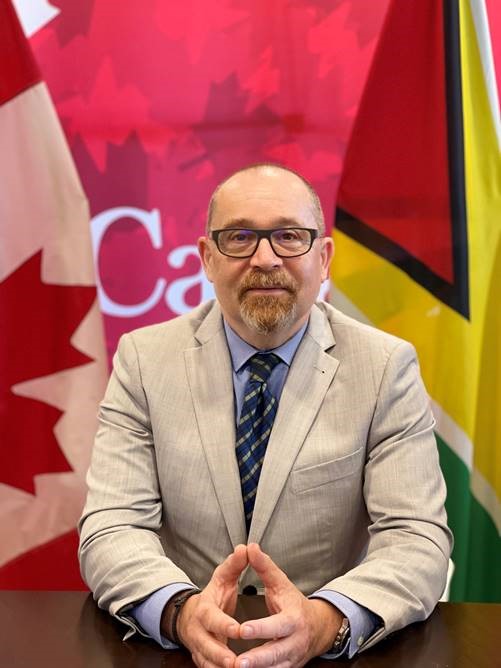Canadian High Commissioner to Guyana, Mark Berman has stressed the importance of Environmental Impact Assessments (EIAs).
Delivering the feature address at a virtual workshop on the legal framework for EIAs here, Berman said “Failure to undertake this type of due diligence could result in costly and harmful effects down the road”.
A release from the Canadian High Commission today said that from August 23 to 25, members of the Environmental Protection Agency (EPA) and related stakeholders participated in the workshop which was executed by the Canada-funded Improved Access to Justice in the Caribbean (IMPACT Justice) Project.
Questions have been raised recently about decisions by the EPA not to require EIAs of some major projects. The sudden redaction by the EPA of updated guidelines for EIAs particularly in the context of the emerging oil and gas industry has also raised concerns.
The EPA is presently in the midst of finalising the terms of reference for an EIA for the gas to shore project.
A press release from the Canadian High Commission follows:
From Monday August 23rd to Wednesday August 25th, staff members at the Environmental Protection Agency (EPA), Ministry of Legal Affairs, and other related stakeholders, participated in a virtual workshop focusing on the Legal Framework for Environmental Impact Assessments (EIAs) In Guyana.
The workshop was executed by the Improved Access to Justice in the Caribbean (IMPACT Justice) Project, which is a regional civil society justice sector reform project funded by the Government of Canada. IMPACT Justice has been operating from within the Caribbean Law Institute Centre at the University of the West Indies (UWI), Cave Hill Campus since 2014.
Recently, the importance of EIAs has come to the forefront in Guyana as the country navigates its new found oil wealth and considers the environmental, economic and social implications on its growth and development.
It is Canada’s hope that this development will be sustainable and supported by the appropriate legislative and policy frameworks to protect the environment for generations to come. EIAs are an important tool in ensuring this sustainable development.
In 2018, IMPACT Justice conducted a review of Guyana’s EIA model as part of a wider analysis of Caribbean EIA provisions which was shared with local stakeholders in 2019. Subsequently, in 2020, the project worked with the EPA to review its Environmental Protection Act. This current workshop was a follow up to that review and addressed topics such as “An Overview of the Guyana Environmental Protection Act”, “Emerging Issues in EIA Litigation”, “Shortcomings of the EPA Provisions”, “Policy Review of the Guyana EPA” and more.
Canadian High Commissioner, Mark Berman, in delivering the feature address during the opening ceremony, explained, “The aim is not to impede development, but rather to predict potential environmental impacts in the early stages of project planning and design in order to find ways to reduce adverse impacts and to provide decision-makers with solutions. In effect, EIAs serve as a policy tool for governments to weigh the environmental, economic and social pros and cons of development.”
“Failure to undertake this type of due diligence could result in costly and harmful effects down the road,” he added.
High Commissioner Berman also spoke about other support Canada provides to environment and climate protection in Guyana including the $20M Canada-Caribbean Resilience Facility with the World Bank which provided technical expertise to improve the construction methodology of the East Demerara Water Conservancy dam, speed up its construction, and reduce the risk of flooding in affected communities.
In responding to High Commissioner Berman, Executive Director of the Environmental Protection Agency, Mr. Kemraj Parsram, stated that the workshop is a “timely collaborative effort” as the EIA is a critical component of the EPA’s statutory mandate and functions.
“The importance of understanding this legal framework which governs EIA cannot be overstated and it is important that we continue to be engaged in improving our processes in keeping with the Environmental Protection Act – more so, in the light of Guyana’s new and developing petroleum sector which brought with it concerns about new and potential significant impacts on the environment,” he stated.
“Such realities require our staff at the EPA, members of its Board of Directors, members of the Environments Assessment Board, our colleagues from the Ministry of Foreign Affairs and other sister agencies to enhance their understanding of Guyana’s EIA framework,” he added.
The facilitators of the workshop were Dr. Fiona Pompey-Handl, an attorney specializing in environmental and development legislation, who worked as a legal advisor on environment, sustainable development and health issues for the Government of Guyana from 1990-1995, Ms. Christine Toppin-Allahar, an attorney-at-law who prepared environmental, planning and coastal zone legislation for countries such as Guyana, Grenada, St Lucia and Antigua & Barbuda, and Dr. Thérèse Yarde, an environmental specialist with over 20 years experience in the biodiversity and environmental sector of the region.
This Environmental Impact Assessments workshop is the second major workshop that IMPACT Justice has conducted in Guyana since the start of the year. The “Sound Policy for Better Law” workshop for Permanent Secretaries and other senior public officials was held in May.

